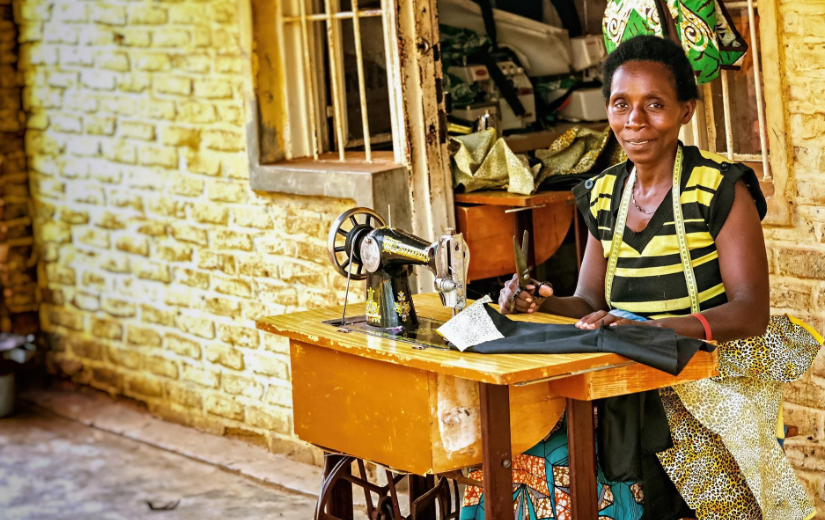About 3,000 Chinese currently live in Rwanda, mainly in the capital, Kigali. There are more than 30 Chinese enterprises on a relatively large scale, mainly engaged in engineering contracting, housing construction, agriculture, engineering consulting, communications, digital television, mobile phone assembly and other business activities. There are about 60 Chinese companies registered in Rwanda.
The main investment projects of Chinese enterprises in Rwanda include the production of garments, furniture, wireless television, Internet services, real estate, hotels, mining, mobile phone accessories, steel structure processing and other products.
Trade ITEMS INCLUDE: WHOLESALE OF HOUSEHOLD APPLIANCES, BUILDING MATERIALS, MOBILE PHONES AND ACCESSORIES, BICYCLES, CHEMICAL FIBER BLENDED FABRICS, GARMENTS, MACHINERY AND EQUIPMENT, FARM TOOLS, SHOES, HARDWARE, FERROUS METALS, AUTOMOBILES AND AUTO ACCESSORIES.
In Rwanda, as in other African countries, there are Chinese-run supermarkets, hotels and hotels, Chinese restaurants and vegetable farms. Alibaba has an e-commerce platform in Rwanda.39bet-xsmb-xổ số tây ninh-xổ số binh phước-xổ số binh dương-xổ số đồng nai
The picture of 2000 supermarkets is Rwanda's largest supermarket mall. It is a Chinese Zhejiang female boss who opened, also runs a large hotel, is Rwanda's richest Chinese, with assets of more than 100 million.
Rwanda is a tiny country, and infrastructure projects are essentially saturated. All state-owned construction companies do business in Rwanda. An engineer in a state-owned company normally pays 16,000 to 20,000 yuan a month, while a shift worker in a state-owned company pays about 16,000 yuan a month.
In some factories run by Chinese in Rwanda, Chinese workers are generally paid 1.5 to 2 times higher than their domestic counterparts.
There are few Chinese people in Rwanda, and Chinese hotels are mainly operated by local wealthy people, so they are not very affected by the epidemic. The annual profit is hundreds of thousands of yuan, and the best profit is about several million yuan.
Rwanda is located on the East African plateau in central and eastern Africa, with an average altitude of 1,600 meters. It is a landlocked country with an area of 26,000 square kilometers and borders with the Democratic Republic of Congo, Tanzania, Uganda and Burundi. Rwanda has a population of about 12.9 million and its capital, Kigali, is considered one of the safest capitals in Africa because of its pleasant climate, cleanliness and excellent security.
Rwanda has enjoyed better security for many years than most African countries. Private possession of firearms is prohibited. In general, Rwanda has a low crime rate.
Rwanda is remembered for the Rwandan genocide of 1994. Rwanda is mainly made up of two ethnic groups, Hutu and Tutsi, who have been in conflict with each other until April 6, 1994, when the plane carrying Hutu Rwandan President Juvenal Habyarimana and the president of Burundi was shot down, which was the immediate trigger for the Rwandan genocide. The genocide of Tutsis across Rwanda the next day became one of the greatest human tragedies of the 20th century. Rwandan officials estimate that more than a million people died in the genocide.
Paul Kagame was elected president in April 2000, and the road to recovery began. Paul Kagame was very wise. He declared that Rwanda would no longer distinguish between Hutus and Tutsis, that they were all Rwandans, and that ethnic hatred would be eliminated. At the same time, learn from China's development model, improve people's livelihood and develop the economy.
 Rwanda implements the state policy of introducing foreign capital and opening to the outside world. Since 2002, Rwanda's economy has grown at an average annual rate of more than 8 percent. It has maintained a rapid growth rate for more than 10 years, creating a miracle of economic development in Rwanda.
Rwanda implements the state policy of introducing foreign capital and opening to the outside world. Since 2002, Rwanda's economy has grown at an average annual rate of more than 8 percent. It has maintained a rapid growth rate for more than 10 years, creating a miracle of economic development in Rwanda.
The total value of goods exported from China to Rwanda in 2021 was USD 335.12 million, an increase of USD 52.58 million compared to the same period in 2020, an increase of 18.6%. China's imports from Rwanda totaled US $28.7 million, a decrease of US $9.48 million, or 24.9 percent, compared with the same period in 2020.
Chinese exports to Rwanda include electronics, machinery, clothing, construction materials, processed food, etc. China's imports from Rwanda mainly include minerals, agricultural products such as coffee, tea, peppers and stevia, and animal products such as hides and leather. China currently gives tariff free treatment to 97 percent of Rwandan exports to China.
Rwanda's climate is rich in chilies, and its habanero is the world's second hottest pepper. It is four times hotter than ordinary chilies, and it is red in color and rich in fragrance. This level of spiciness is suitable for spicy hot pot and so on, which is more suitable for the appetite of Chinese people. Now this kind of pepper is exported to China. Xiao Long, a Chinese in Rwanda, is planting peppers in Rwanda and exporting them to China.
Rwanda's gross domestic product (GDP) in 2021 was $11.3 billion, with a GDP per capita of $876. It is one of the poorest countries in the world.
Average wages in Rwanda range from $55 to $90 a month for ordinary workers and $300 a month for skilled workers.